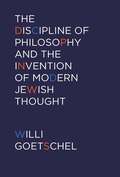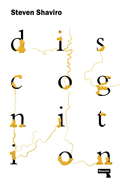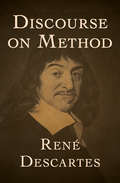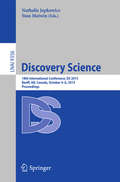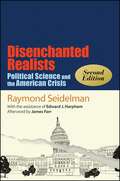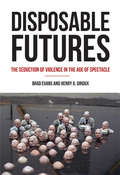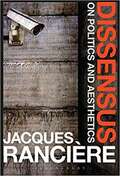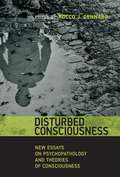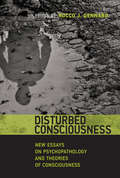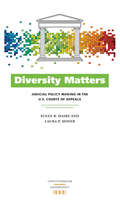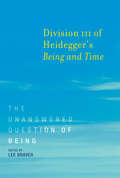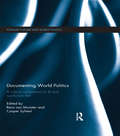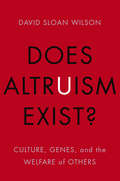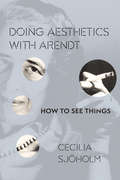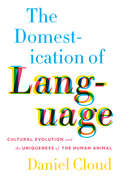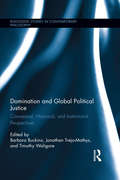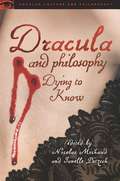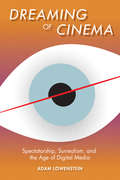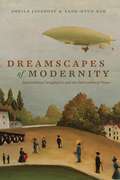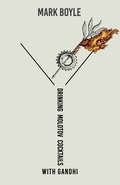- Table View
- List View
The Discipline of Philosophy and the Invention of Modern Jewish Thought
by Willi GoetschelExploring the subject of Jewish philosophy as a controversial construction site of the project of modernity, this book examines the implications of the different and often conflicting notions that drive the debate on the question of what Jewish philosophy is or could be. The idea of Jewish philosophy begs the question of philosophy as such. But “Jewish philosophy” does not just reflect what “philosophy” lacks. Rather, it challenges the project of philosophy itself. Examining the thought of Spinoza, Moses Mendelssohn, Heinrich Heine, Hermann Cohen Franz Rosenzweig, Martin Buber, Margarete Susman, Hermann Levin Goldschmidt, and others, the book highlights how the most philosophic moments of their works are those in which specific concerns of their “Jewish questions” inform the rethinking of philosophy’s disciplinarity in principal terms. The long overdue recognition of the modernity that informs the critical trajectories of Jewish philosophers from Spinoza and Mendelssohn to the present emancipates not just “Jewish philosophy” from an infelicitous pigeonhole these philosophers so pointedly sought to reject but, more important, emancipates philosophy from its false claims to universalism.
Discognition
by Steven ShaviroWhat is consciousness? What is it like to feel pain, or to see the color red? Do robots and computers really think? For that matter, do plants and amoebas think? If we ever meet intelligent aliens, will we be able to understand what they say to us? Philosophers and scientists are still unable to answer questions like these. Perhaps science fiction can help. In Discognition, Steven Shaviro looks at science fiction novels and stories that explore the extreme possibilities of human and alien sentience.From the Trade Paperback edition.
Discourse on Method: Large Print
by René DescartesDescartes&’s revolutionary treatise on reason and scientific thought, which sparked radical breakthroughs in mathematics, philosophy, and metaphysics After he finished school, René Descartes was left with more doubts than certainties. His Jesuit education included some of the best teaching available in mathematics, physics, and letters, and yet Descartes found the foundations of his schooling hollow. Determined to discover for himself what was real, he spent the next nine years traveling through Europe, interacting with locals of all walks of life, including nobles, soldiers, and laborers, in search of the breadth of experience that would later inspire his greatest work: Discourse on Method. When it was first published, the book offered a remarkable new approach to gaining knowledge based on reason and skepticism, the steps for which Descartes lays out sequentially, from the deconstruction of all previously held beliefs to the slow and methodical rebuilding of fact anchored in the first and most innate truth: I think, therefore I am. This ebook has been professionally proofread to ensure accuracy and readability on all devices.
Discovery Science
by Stan Matwin Nathalie JapkowiczThis book constitutes the proceedings of the 17th International Conference on Discovery Science, DS 2015, held in banff, AB, Canada in October 2015. The 16 long and 12 short papers presendted together with 4 invited talks in this volume were carefully reviewed and selected from 44 submissions. The combination of recent advances in the development and analysis of methods for discovering scienti c knowledge, coming from machine learning, data mining, and intelligent data analysis, as well as their application in various scienti c domains, on the one hand, with the algorithmic advances in machine learning theory, on the other hand, makes every instance of this joint event unique and attractive.
Disenchanted Realists, Second Edition: Political Science and the American Crisis (SUNY series in Political Theory: Contemporary Issues)
by Raymond SeidelmanWhen it first appeared three decades ago, Raymond Seidelman's provocative study of the history of political science both attracted a great deal of attention and generated vibrant controversy. Where prior studies of the history of political science had concentrated on the evolution of the scientific study of politics, Seidelman placed his focus on the tenuous relationship between the scientific study of politics and the real world of American democracy. Examining paired sets of political science luminaries over a century, he finds recurrent hopes that a "science of politics" can be a "science for politics," and recurrent frustrations that neither elites nor democratic publics respond to the findings of political science or defer to its claims of scientific authority. Analyzing the reasons for political science's limited impact on democratic reform, Seidelman raises the prospect that the progressive dreams of American political science, rising and falling over the course of a century, may finally be exhausted.For this new edition, Bruce Miroff and Stephen Skowronek have written a foreword that relates the genesis of the book and the career of the late Ray Seidelman, while James Farr, a distinguished scholar of political science history, has contributed an extensive afterword. Whether readers concur with or dispute Seidelman's conclusions about the practical significance of political science, they will be challenged by the scope and power of Disenchanted Realists. The book invites a new generation of political scientists to examine the problematic development of the discipline they practice and to reflect on the public meanings of what they do in their own careers.
Disposable Futures
by Brad Evans Henry A. GirouxDisposable Futures makes the case that we have not just become desensitized to violence, but rather, that we are being taught to desire it.From movies and other commercial entertainment to "extreme" weather and acts of terror, authors Brad Evans and Henry Giroux examine how a contemporary politics of spectacle--and disposability--curates what is seen and what is not, what is represented and what is ignored, and ultimately, whose lives matter and whose do not.Disposable Futures explores the connections between a range of contemporary phenomena: mass surveillance, the militarization of police, the impact of violence in film and video games, increasing disparities in wealth, and representations of ISIS and the ongoing terror wars. Throughout, Evans and Giroux champion the significance of public education, social movements and ideas that rebel against the status quo in order render violence intolerable."Disposable Futures poses, and answers, the pressing question of our times: How is it that in this post-Fascist, post-Cold War era of peace and prosperity we are saddled with more war, violence, inequality and poverty than ever? The neoliberal era, Evans and Giroux brilliantly reveal, is defined by violence, by drone strikes, 'smart' bombs, militarized police, Black lives taken, prison expansion, corporatized education, surveillance, the raw violence of racism, patriarchy, starvation and want. The authors show how the neoliberal regime normalizes violence, renders its victims disposable, commodifies the spectacle of relentless violence and sells it to us as entertainment, and tries to contain cultures of resistance. If you're not afraid of the truth in these dark times, then read this book. It is a beacon of light."--Robin D. G. Kelley, author of Freedom Dreams: The Black Radical Imagination"Disposable Futures confronts a key conundrum of our times: How is it that, given the capacity and abundance of resources to address the critical needs of all, so many are having their futures radically discounted while the privileged few dramatically increase their wealth and power? Brad Evans and Henry Giroux have written a trenchant analysis of the logic of late capitalism that has rendered it normal to dispose of any who do not service the powerful. A searing indictment of the socio-technics of destruction and the decisions of their deployability. Anyone concerned with trying to comprehend these driving dynamics of our time would be well served by taking up this compelling book."--David Theo Goldberg, author of The Threat of Race: Reflections on Racial NeoliberalismBrad Evans and Henry A. Giroux are internationally renowned educators, authors, and intellectuals. Together, they curate a forum for Truthout.com that explores the theme of "Disposable Futures." Evans is director of histories of violence project at the University of Bristol, United Kingdom. Giroux holds the global TV network chair professorship at McMaster University.educators, authors, and intellectuals. Together, they curate a forum for Truthout.com that explores the theme of "Disposable Futures." Evans is director of histories of violence project at the University of Bristol, United Kingdom. Giroux holds the global TV network chair professorship at McMaster University.
Dissensus: On Politics and Aesthetics
by Jacques Rancière Steven CorcoranDissensus: On Politics and Aesthetics brings together some of Jacques Rancière's most recent writings on art and politics to show the critical potential of two of his most important concepts: the aesthetics of politics and the politics of aesthetics. <p><p> In this fascinating collection, Rancière engages in a radical critique of some of his major contemporaries on questions of art and politics: Gilles Deleuze, Antonio Negri, Giorgio Agamben, Alain Badiou and Jacques Derrida. The essays show how Rancière's ideas can be used to analyse contemporary trends in both art and politics, including the events surrounding 9/11, war in the contemporary consensual age, and the ethical turn of aesthetics and politics. Rancière elaborates new directions for the concepts of politics and communism, as well as the notion of what a 'politics of art' might be. <p><p> This important collection includes several essays that have never previously been published in English, as well as a brand new afterword. Together these essays serve as a superb introduction to the work of one of the world's most influential contemporary thinkers.
Dissent on Core Beliefs: Religious and Secular Perspectives (The Ethikon Series in Comparative Ethics)
by Simone Chambers Peter NoscoDifference, diversity and disagreement are inevitable features of our ethical, social and political landscape. This collection of new essays investigates the ways that various ethical and religious traditions have dealt with intramural dissent; the volume covers nine separate traditions: Confucianism, Buddhism, Christianity, Judaism, Islam, liberalism, Marxism, South Asian religions and natural law. Each chapter lays out the distinctive features, history and challenges of intramural dissent within each tradition, enabling readers to identify similarities and differences between traditions. The book concludes with an Afterword by Michael Walzer, offering a synoptic overview of the challenge of intramural dissent and the responses to that challenge. Committed to dialogue across cultures and traditions, the collection begins that dialogue with the common challenges facing all traditions: how to maintain cohesion and core values in the face of pluralism, and how to do this in a way that is consistent with the internal ethical principles of the traditions. Each essay uses contemporary as well as historical illustrations to tackle questions of pluralism and dissent. Discusses multiple religious and ethical traditions in an accessible way. The chapters employ a common rubric facilitating comparison across essays and across traditions.
Disturbed Consciousness
by Rocco J. GennaroIn Disturbed Consciousness, philosophers and other scholars examine various psychopathologies in light of specific philosophical theories of consciousness. The contributing authors -- some of them discussing or defending their own theoretical work -- consider not only how a theory of consciousness can account for a specific psychopathological condition but also how the characteristics of a psychopathology might challenge such a theory. Thus one essay defends the higher-order thought (HOT) theory of consciousness against the charge that it cannot account for somatoparaphrenia (a delusion in which one denies ownership of a limb). Another essay argues that various attempts to explain away such anomalies within subjective theories of consciousness fail.Other essays consider such topics as the application of a model of unified consciousness to cases of brain bisection and dissociative identity disorder; prefrontal and parietal underconnectivity in autism and other psychopathologies; self-deception and the self-model theory of subjectivity; schizophrenia and the vehicle theory of consciousness; and a shift in emphasis away from an internal (or brainbound) approach to psychopathology to an interactive one. Each essay offers a distinctive perspective from the intersection of philosophy, consciousness research, and psychiatry.ContributorsAlexandre Billon, Andrew Brook, Paula Droege, Rocco J. Gennaro, Philip Gerrans, William Hirstein, Jakob Hohwy, Uriah Kriegel, Timothy Lane, Thomas Metzinger, Erik Myin, Inez Myin-Germeys, Myrto Mylopoulos, Gerard O'Brien, Jon Opie, J. Kevin O'Regan, Iuliia Pliushch, Robert Van Gulick
Disturbed Consciousness: New Essays on Psychopathology and Theories of Consciousness (Philosophical Psychopathology)
by Rocco J. GennaroEssays defend, discuss, and critique specific theories of consciousness with respect to various psychopathologies.In Disturbed Consciousness, philosophers and other scholars examine various psychopathologies in light of specific philosophical theories of consciousness. The contributing authors—some of them discussing or defending their own theoretical work—consider not only how a theory of consciousness can account for a specific psychopathological condition but also how the characteristics of a psychopathology might challenge such a theory. Thus one essay defends the higher-order thought (HOT) theory of consciousness against the charge that it cannot account for somatoparaphrenia (a delusion in which one denies ownership of a limb). Another essay argues that various attempts to explain away such anomalies within subjective theories of consciousness fail.Other essays consider such topics as the application of a model of unified consciousness to cases of brain bisection and dissociative identity disorder; prefrontal and parietal underconnectivity in autism and other psychopathologies; self-deception and the self-model theory of subjectivity; schizophrenia and the vehicle theory of consciousness; and a shift in emphasis away from an internal (or brainbound) approach to psychopathology to an interactive one. Each essay offers a distinctive perspective from the intersection of philosophy, consciousness research, and psychiatry.ContributorsAlexandre Billon, Andrew Brook, Paula Droege, Rocco J. Gennaro, Philip Gerrans, William Hirstein, Jakob Hohwy, Uriah Kriegel, Timothy Lane, Thomas Metzinger, Erik Myin, Inez Myin-Germeys, Myrto Mylopoulos, Gerard O'Brien, Jon Opie, J. Kevin O'Regan, Iuliia Pliushch, Robert Van Gulick
Diversity Matters: Judicial Policy Making in the U.S. Courts of Appeals (Constitutionalism and Democracy)
by Susan B. Haire Laura P. MoyerUntil President Jimmy Carter launched an effort to diversify the lower federal courts, the U. S. courts of appeals had been composed almost entirely of white males. But by 2008, over a quarter of sitting judges were women and 15 percent were African American or Hispanic. Underlying the argument made by administration officials for a diverse federal judiciary has been the expectation that the presence of women and minorities will ensure that the policy of the courts will reflect the experiences of a diverse population. Yet until now, scholarly studies have offered only limited support for the expectation that judges' race, ethnicity, or gender impacts their decision making on the bench. In Diversity Matters, Susan B. Haire and Laura P. Moyer employ innovative new methods of analysis to offer a fresh examination of the effects of diversity on the many facets of decision making in the federal appellate courts. Drawing on oral histories and data on appellate decisions through 2008, the authors' analyses demonstrate that diversity on the bench affects not only individual judges' choices but also the overall character and quality of judicial deliberation and decisions. Looking forward, the authors anticipate the ways in which these process effects will become more pronounced as a result of the highly diverse Obama appointment cohort.
Division III of Heidegger's Being and Time: The Unanswered Question of Being
by Lee BraverLeading philosophers and scholars speculate on what Heidegger's unfinished masterpiece might have said, why Heidegger didn't publish it, and what being actually means.Heidegger's Being and Time is one of the most influential and important books in the history of philosophy, but it was left unfinished. The parts we have of it, Divisions I and II of Part One, were meant to be merely preparatory for the unwritten Division III, which was to have formed the point of the entire book when it turned to the topic of being itself. In this book, leading Heidegger scholars and philosophers influenced by Heidegger take up the unanswered questions in Heidegger's masterpiece, speculating on what Division III would have said, and why Heidegger never published it. The contributors' task—to produce a secondary literature on a nonexistent primary work—seems one out of fiction by Borges or Umberto Eco. Why did Heidegger never complete Being and Time? Did he become dissatisfied with it? Did he judge it too subjectivistic, not historical enough, too individualistic, too existential? Was abandoning it part of Heidegger's “Kehre”, his supposed turning from his early work to his later work? Might Division III have offered a bridge between the two phases, if a division exists between them? And what does being mean, after all? The contributors, in search of lost Being and Time, consider these and other topics, shedding new light on Heidegger's thought.ContributorsAlain Badiou, Lee Braver, Daniel Dahlstrom, Charles Guignon, Graham Harman, Karsten Harries, Ted Kisiel, Denis McManus, Eric S. Nelson, Richard Polt, François Raffoul, Thomas Sheehan, Iain Thomson, Kate Withy, Julian Young
Documenting World Politics: A Critical Companion to IR and Non-Fiction Film (Popular Culture and World Politics)
by Casper Sylvest Rens Van MunsterAs a central component of contemporary culture, films mirror and shape political debate. Reflecting on this development, scholars in the field of International Relations (IR) increasingly explore the intersection of TV series, fiction film and global politics. So far, however, virtually no systematic scholarly attention has been given to documentary film within IR. This book fills this void by offering a critical companion to the subject aimed at assisting students, teachers and scholars of IR in understanding and assessing the various ways in which documentary films matter in global politics. The authors of this volume argue that much can be gained if we do not just think of documentaries as a window on or intervention in reality, but as a political epistemology that – like theories – involve particular postures, strategies and methodologies towards the world to which they provide access. This work will be of great interest to students and scholars of international relations, popular culture and world politics and media studies alike.
Does Altruism Exist?
by David Sloan WilsonDavid Sloan Wilson, one of the world’s leading evolutionists, addresses a question that has puzzled philosophers, psychologists, and evolutionary biologists for centuries: Does altruism exist naturally among the Earth’s creatures? The key to understanding the existence of altruism, Wilson argues, is by understanding the role it plays in the social organization of groups. Groups that function like organisms indubitably exist, and organisms evolved from groups. Evolutionists largely agree on how functionally organized groups evolve, ending decades of controversy, but the resolution casts altruism in a new light: altruism exists but shouldn’t necessarily occupy center stage in our understanding of social behavior. After laying a general theoretical foundation, Wilson surveys altruism and group-level functional organization in our own species—in religion, in economics, and in the rest of everyday life. He shows that altruism is not categorically good and can have pathological consequences. Finally, he shows how a social theory that goes beyond altruism by focusing on group function can help to improve the human condition in a practical sense. Does Altruism Exist? puts old controversies to rest and will become the center of debate for decades to come.
Doing Aesthetics with Arendt
by Cecilia SjöholmCecilia Sjöholm reads Hannah Arendt as a philosopher of the senses, grappling with questions of vision, hearing, and touch even in her political work. Constructing an Arendtian theory of aesthetics from the philosopher's fragmentary writings on art and perception, Sjöholm begins a vibrant new chapter in Arendt scholarship that expands her relevance for contemporary philosophers. Arendt wrote thoughtfully about the role of sensibility and aesthetic judgment in political life and on the power of art to enrich human experience. Sjöholm draws a clear line from Arendt's consideration of these subjects to her reflections on aesthetic encounters and the works of art mentioned in her published writings and stored among her memorabilia. This delicate effort allows Sjöholm to revisit Arendt's political concepts of freedom, plurality, and judgment from an aesthetic point of view and incorporate Arendt's insight into current discussions of literature, music, theater, and visual art. Though Arendt did not explicitly outline an aesthetics, Sjöholm's work substantively incorporates her perspective into contemporary reckonings with radical politics and their relationship to art.
Doing Aesthetics with Arendt: How to See Things (Columbia Themes in Philosophy, Social Criticism, and the Arts)
by Cecilia SjöholmCecilia Sjöholm reads Hannah Arendt as a philosopher of the senses, grappling with questions of vision, hearing, and touch even in her political work. Constructing an Arendtian theory of aesthetics from the philosopher's fragmentary writings on art and perception, Sjöholm begins a vibrant new chapter in Arendt scholarship that expands her relevance for contemporary philosophers.Arendt wrote thoughtfully about the role of sensibility and aesthetic judgment in political life and on the power of art to enrich human experience. Sjöholm draws a clear line from Arendt's consideration of these subjects to her reflections on aesthetic encounters and works of art mentioned in her published writings and stored among her memorabilia. This delicate effort allows Sjöholm to revisit Arendt's political concepts of freedom, plurality, and judgment from an aesthetic point of view and incorporate Arendt's insight into current discussions of literature, music, theater, and visual art. Though Arendt did not explicitly outline an aesthetics, Sjöholm's work substantively incorporates her perspective into contemporary reckonings with radical politics and their relationship to art.
The Domestication of Language: Cultural Evolution and the Uniqueness of the Human Animal
by Daniel CloudLanguage did not evolve only in the distant past. Our shared understanding of the meanings of words is ever-changing, and we make conscious, rational decisions about which words to use and what to mean by them every day. Applying Charles Darwin's theory of "unconscious artificial selection" to the evolution of linguistic conventions, Daniel Cloud suggests a new, evolutionary explanation for the rich, complex, and continually reinvented meanings of our words.The choice of which words to use and in which sense to use them is both a "selection event" and an intentional decision, making Darwin's account of artificial selection a particularly compelling model of the evolution of words. After drawing an analogy between the theory of domestication offered by Darwin and the evolution of human languages and cultures, Cloud applies his analytical framework to the question of what makes humans unique and how they became that way. He incorporates insights from David Lewis's Convention, Brian Skyrms's Signals, and Kim Sterelny's Evolved Apprentice, all while emphasizing the role of deliberate human choice in the crafting of language over time. His clever and intuitive model casts humans' cultural and linguistic evolution as an integrated, dynamic process, with results that reach into all corners of our private lives and public character.
The Domestication of Language
by Daniel CloudA provocative investigation into the making of human languages and the exceptional nature of human adaptation.
Domination and Global Political Justice: Conceptual, Historical and Institutional Perspectives (Routledge Studies in Contemporary Philosophy #66)
by Barbara Buckinx Jonathan Trejo-Mathys Timothy WaligoreDomination consists in subjection to the will of others and manifests itself both as a personal relation and a structural phenomenon serving as the context for relations of power. Domination has again become a central political concern through the revival of the republican tradition of political thought (not to be confused with the US political party). However, normative debates about domination have mostly remained limited to the context of domestic politics. Also, the republican debate has not taken into account alternative ways of conceptualizing domination. Critical theorists, liberals, feminists, critical race theorists, and postcolonial writers have discussed domination in different ways, focusing on such problems as imperialism, racism, and the subjection of indigenous peoples. This volume extends debates about domination to the global level and considers how other streams in political theory and nearby disciplines enrich, expand upon, and critique the republican tradition’s contributions to the debate. This volume brings together, for the first time, mostly original pieces on domination and global political justice by some of this generation’s most prominent scholars, including Philip Pettit, James Bohman, Rainer Forst, Amy Allen, John McCormick, Thomas McCarthy, Charles Mills, Duncan Ivison, John Maynor, Terry Macdonald, Stefan Gosepath, and Hauke Brunkhorst.
Doubt in Islamic Law
by Intisar A. RabbThis book considers an important and largely neglected area of Islamic law by exploring how medieval Muslim jurists resolved criminal cases that could not be proven beyond a doubt. Intisar A. Rabb calls into question a controversial popular notion about Islamic law today, which is that Islamic law is a divine legal tradition that has little room for discretion or doubt, particularly in Islamic criminal law. Despite its contemporary popularity, that notion turns out to have been far outside the mainstream of Islamic law for most of its history. Instead of rejecting doubt, medieval Muslim scholars largely embraced it. In fact, they used doubt to enlarge their own power and to construct Islamic criminal law itself. Through a close examination of legal, historical, and theological sources, and a range of illustrative case studies, this book shows that Muslim jurists developed a highly sophisticated and regulated system for dealing with Islam's unique concept of doubt, which evolved from the seventh to the sixteenth century.
Dracula and Philosophy
by Janelle Pötzsch Nicolas MichaudTwenty-four nocturnal philosophers stake out and vivisect Dracula from many angles, unearthing evidence from numerous movies and shows-macabre, terrifying, tragic, and comic. <P><P> Altmann decides whether Dracula can really be blamed for his crimes, since it's his nature as a vampire to behave a certain way. Arp argues that Dracula's addiction to live human blood dooms him to perpetual misery. Karavitis sees Dracula as a Randian individual pitted against the Marxist collective. Ketcham contrives a meeting between Dracula and the Jewish theologian Maimonides. Littmann maintains that if we disapprove of Dracula's behavior, we ought to be vegetarians. Mahon uses the example of Dracula to resolve nagging problems about the desirability of immortality. McCrossin and Wolfe, disinter some of the re-interpretations of this now-mythical character, and asks whether we can identify an essential Dracula. Pramik shows how the Dracula tale embodies Kierkegaard's three stages of life. Barkman and Versteeg ponder what it would really feel like to be Dracula. <P> The Greens publish some previous unknown letters between Dracula and Camus's Meursault. Vuckovich looks at the sexual morality of characters in the Dracula saga. De Waal explains that "Dragula" is scary because every time this being appears, it causes "gender trouble."
Dreaming of Cinema: Spectatorship, Surrealism, and the Age of Digital Media (Film and Culture Series)
by Adam LowensteinVideo games, YouTube channels, Blu-ray discs, and other forms of "new" media have made theatrical cinema seem "old." A sense of "cinema lost" has accompanied the ascent of digital media, and many worry film's capacity to record the real is fundamentally changing. Yet the Surrealist movement never treated cinema as a realist medium and understood our perceptions of the real itself to be a mirage. Returning to their interpretation of film's aesthetics and function, this book reads the writing, films, and art of Luis Buñuel, Salvador Dalí, Man Ray, André Breton, André Bazin, Roland Barthes, Georges Bataille, Roger Caillois, and Joseph Cornell and recognizes their significance for the films of David Cronenberg, Nakata Hideo, and Atom Egoyan; the American remake of the Japanese Ring (1998); and a YouTube channel devoted to Rock Hudson. Offering a positive alternative to cinema's perceived crisis of realism, this innovative study enriches the meaning of cinematic spectatorship in the twenty-first century.
Dreaming of Cinema
by Adam LowensteinAdam Lowenstein argues that Surrealism's encounter with film can help redefine the meaning of cinematic spectatorship in an era of popular digital entertainment.
Dreamscapes of Modernity: Sociotechnical Imaginaries and the Fabrication of Power
by Sheila Jasanoff Sang-Hyun KimDreamscapes of Modernity offers the first book-length treatment of sociotechnical imaginaries, a concept originated by Sheila Jasanoff and developed in close collaboration with Sang-Hyun Kim to describe how visions of scientific and technological progress carry with them implicit ideas about public purposes, collective futures, and the common good. The book presents a mix of case studies--including nuclear power in Austria, Chinese rice biotechnology, Korean stem cell research, the Indonesian Internet, US bioethics, global health, and more--to illustrate how the concept of sociotechnical imaginaries can lead to more sophisticated understandings of the national and transnational politics of science and technology. A theoretical introduction sets the stage for the contributors' wide-ranging analyses, and a conclusion gathers and synthesizes their collective findings. The book marks a major theoretical advance for a concept that has been rapidly taken up across the social sciences and promises to become central to scholarship in science and technology studies.
Drinking Molotov Cocktails with Gandhi
by Mark BoyleMore than ever, people are longing for deep and meaningful change. Another world is not only possible; it is essential. Yet despite our creative and determined efforts to attain social justice and ecological sustainability, our global crises continue to deepen.In Drinking Molotov Cocktails with Gandhi, best-selling author Mark Boyle argues that our political and economic system has brought us to the brink of climate catastrophe, ransacking ecosystems and unraveling communities for the benefit of the few at the expense of the many. He makes a compelling case that we must "rewild" the political landscape, as history teaches us that positive social change has always been wrought by movements prepared to use any means available.The time has come for pacifists, revolutionaries, and freedom fighters to work together for the creation of a world worth sustaining. Eloquent, visionary, and beautifully written, this incendiary manifesto strikes at the heart of the world's crises and reframes our understanding of how to solve them, signaling a turning point in our journey towards an ecologically just society.The three R's of the climate change generation--reduce, reuse, and recycle--are long overdue for an upgrade .Welcome to resist, revolt, rewild.Mark Boyle is the author of The Moneyless Man and The Moneyless Manifesto. He lived completely without money for three years, and is a director of the global sharing community streetbank.com.
